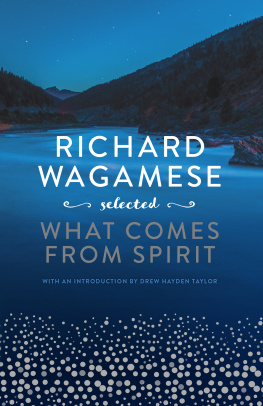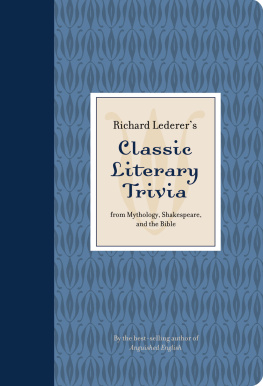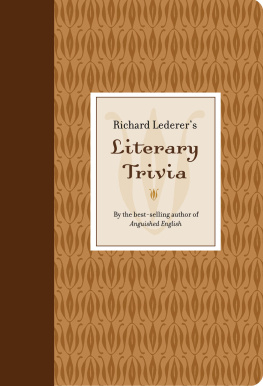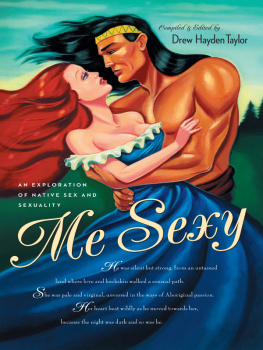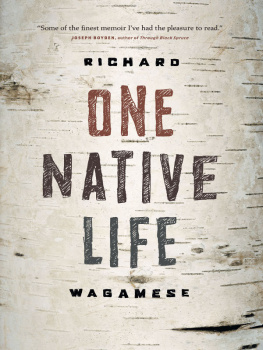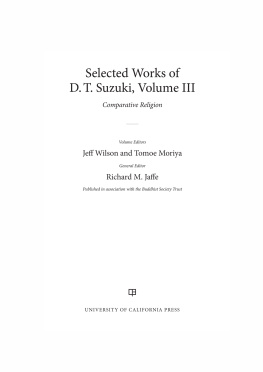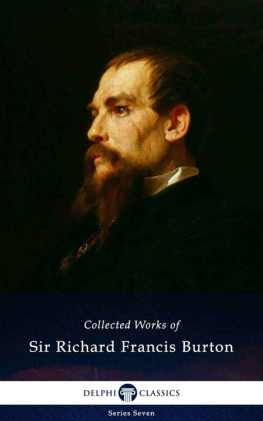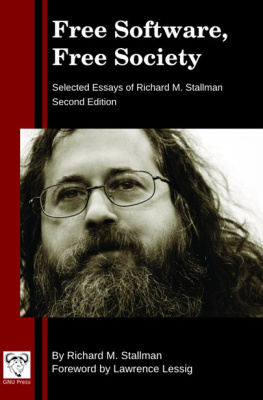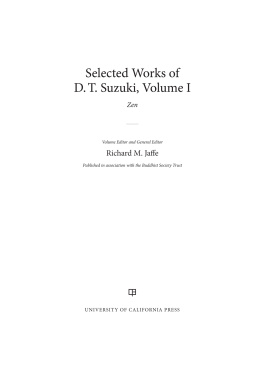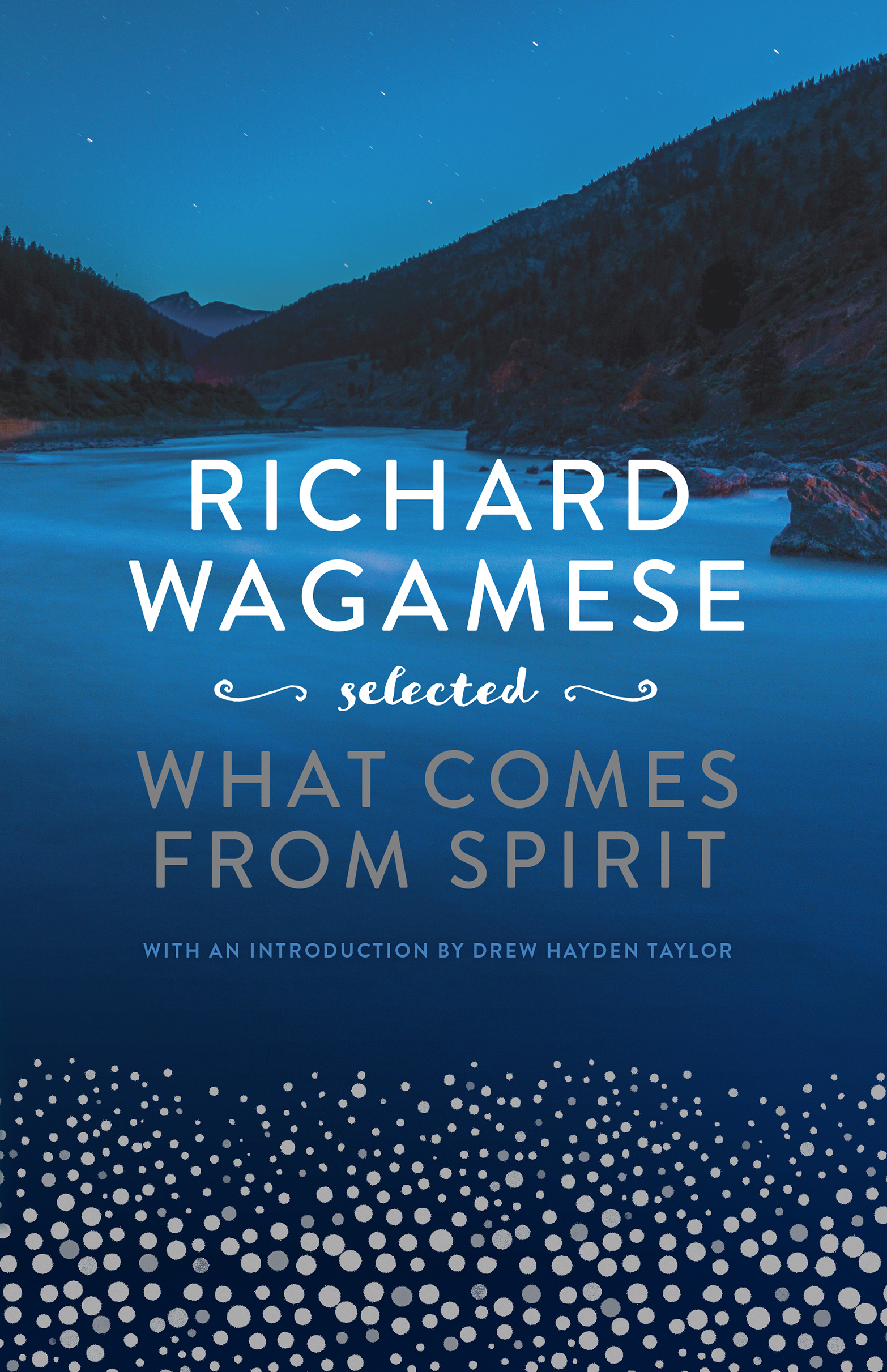Richard Wagamese Selected
Richard Wagamese Selected
What Comes from Spirit
with an introduction by
Drew Hayden Taylor


For each copy of this book sold, the publisher will make a donation to the Ontario Arts Foundation in support of the Indigenous Voices Awards: indigenousvoicesawards.org
Text copyright 2021 Estate of Richard Allen Wagamese Gilkinson
Introduction copyright 2021 Drew Hayden Taylor
All rights reserved. No part of this publication may be reproduced, stored in a retrieval system or transmitted, in any form or by any means, without prior permission of the publisher or, in the case of photocopying or other reprographic copying, a licence from Access Copyright, .
Douglas and McIntyre (2013) Ltd.
P.O. Box 219, Madeira Park, BC , V 0 N 2 H 0
www.douglas-mcintyre.com
Front cover image: Thompson River by Chris Harris, All Canada Photos
Cover design by Diane Robertson
Text design by Shed Simas / Ona Design
Printed and bound in Canada
Printed on 100 % recycled paper



Douglas and McIntyre acknowledges the support of the Canada Council for the Arts, the Government of Canada, and the Province of British Columbia through the BC Arts Council.
Library and Archives Canada Cataloguing in Publication
Title: Richard Wagamese selected : what comes from spirit.
Other titles: Works. Selections | What comes from spirit
Names: Wagamese, Richard, author. | Taylor, Drew Hayden, 1962- writer of introduction.
Description: Introduction by Drew Hayden Taylor. | Includes bibliographical references.
Identifiers: Canadiana (print) 2021025484 X | Canadiana (ebook) 20210254866 | ISBN 9781771622752 (hardcover) | ISBN 9781771622769 ( EPUB )
Subjects: LCGFT : Essays. | LCGFT : Creative nonfiction.
Classification: LCC PS 8595. A 363 A 6 2021 | DDC C 818/.5408dc23
Contents
- I
The Land is a Feeling - II
The Truth Stays the Same - III
There Are No Strangers - IV
We Are All Story
Introduction
Drew Hayden Taylor
Ive come to understand that the pain of a wound or a loss is over as soon as it happens. What follows is the pain of getting well.
Richard Wagamese
Another Richard Wagamese book for the public to enjoy. The literary gods indeed must be feeling benevolent.
In the Canadian literary landscape, there exists what is known as The Two Margarets: Laurence and Atwood. Two phenomenal writers who, it can safely be said, had a hand in the development of contemporary Canadian literature. You say The Two Margarets, and if you cant immediately name them and some of their works... well, its time to hand in your citizenship.
In the Indigenous literary universe, the same can be said about The Two Richards: Wagamese and Van Camp. Anybody familiar with the stories coming from our communities will know those names. If not, time to hand in your Status card. And also, I guess, your citizenship as well.
But it is perhaps Richard Wagamese who has captured the Canadian zeitgeist best of all us Indigenous writers. His prolific outpouring of quality storytelling and his unfortunate death have cemented him quite firmly in what I (and to my knowledge nobody else) refer to as the Contemporary Indigenous Literary Renaissance. Novels, poetry, non-fiction... he was a master of them all. If his name was attached to it, you knew there was substance behind it. He was an amazing writer, and more importantly, an amazing man. His smile was as bright as his craft.
He was also one of those rare writers who always had something pertinent to say. That comes, possibly, from living such a complex life. Part of the infamous Sixties Scoop, Richard had a lot of life experience with the trials and tribulations of being an Indigenous youth in Canada to draw upon for his work. Add to that his eventual return to his family, people and culture, and there was enough experience instilled in him for several lifetimes.
A thousand years ago when I was taking my first infant steps as a literary storyteller, I wondered if I was doing the right thing. I had stories to tell but I didnt know if I should be doing that. Back then, there werent a lot of us around and job opportunities for us First Nations dudes (writers notwithstanding) were limited: fishing guide, heavy equipment operator, steel worker and perhaps an actor on The Beachcombers.
Then I happened upon a traditional storyteller just north of Manitoulin Island who took me aside and told me, quite emphatically, We need the new stories as much as we need the old stories. And that is how I have always perceived Richard: a contemporary storyteller. A word warrior if you must, telling his stories to the world. His words helped the dominant culture to understand this generation of Indigenous people. They also helped us, I mean those same Indigenous people, to comprehend and appreciate the power of two things: the human mind and a keyboard. Together, those two things can make all things possible.
Richards magical tales, in whatever form, had that power to change the world. And they did. The number of people whom I have come across who have been personally moved by his words... well, that would fill up a book in itself. His readers feel his pain and his joy, his confusion and his understanding. And they come away the better for it.
Case in point: this collection of writings in particular. They are an assemblage of his thoughts, short pieces, and in some cases, brief reflections gathered from social media. Idle thoughts that Richard shared with the world. Gathered from his blog, newspaper columns and Facebook account, there are over two decades of topics that Richard pondered about. In these pages, you will see his wanderings, his philosophy, his searching and his delight at what the latter half of his life had provided for him and how it reflected on his first half. There could be no better window into the soul of the man behind such books as Indian Horse, Medicine Walk and One Native Life.
Stories, and I speak as a writer, have a soul. They have a spirit. They have a lifeat least, the good ones do. This is true for all works of art. They should have their creators DNA in them. So, you know when youve come across a Wagamese original. Sometimes cruel and critical, other times light and life-affirming, his musings will take you to so many unexpected places.
As an artist, Richard always made his past front and centre in his writings. Whether those experiences were good or bad, they flavoured everything he worked on. The man wrote about what had happened in his young and not-so-young life, whether directly or hidden behind the curtains of prose fiction. And his departure from this earth frequently makes us wonder where his writings would have led us in the future. In recognition of the mentorship Richard showed to emerging writers, part of the publishers proceeds from this book will be given to the Indigenous Voices Awards to support the next generation of Indigenous literary talent.

